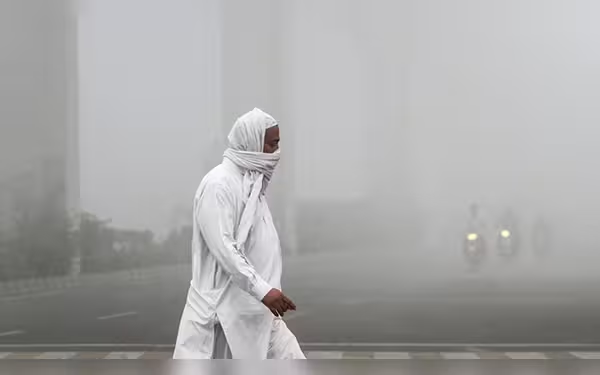Saturday, November 16, 2024 07:53 PM
Punjab Smog Crisis: Lahore and Peshawar Face Hazardous Air Quality
- Lahore's AQI reaches 565, Multan at 955.
- Peshawar's air quality worsens, affecting health.
- Authorities close public spaces until November 17.
 Image Credits: geo
Image Credits: geoPunjab faces a severe smog crisis with hazardous air quality in Lahore and Peshawar, prompting public space closures and health warnings.
The ongoing battle against air pollution in Pakistan has reached alarming levels, particularly in the province of Punjab. As temperatures drop, the toxic smog that blankets the region has intensified, leading to severe health risks for residents. Lahore has once again been identified as one of the most polluted cities globally, with Multan recording the worst air quality in the country. The situation has worsened, affecting not only Punjab but also Khyber Pakhtunkhwa, where the provincial capital, Peshawar, is now engulfed in hazardous air.
On November 11, 2024, the air quality index (AQI) in Lahore soared to a staggering 565, indicating a level of pollution that is 71.6 times higher than what the World Health Organization considers safe. Multan's AQI reached an alarming 955, while Peshawar recorded 509, all of which fall into the 'hazardous' category. The thick layer of smog has reduced visibility to near zero in several cities, causing widespread traffic disruptions. Major motorways, including M2, M3, M4, and M5, have been closed at various points to prevent accidents, leading to significant delays for commuters.
The impact of the smog crisis extends beyond road travel. Flight operations at Faisalabad and Multan airports have been severely disrupted, with numerous flights being diverted or canceled. For instance, flights from Jeddah to Multan were canceled, and several others faced delays of up to three hours. Train services have also been affected, with delays reported for multiple trains traveling across the country.
In response to the deteriorating air quality, authorities in Punjab have taken drastic measures, including closing public spaces and banning outdoor activities in major cities until November 17. This decision comes as health issues related to air pollution, such as eye and throat infections and respiratory diseases, have surged. Citizens are advised to limit outdoor activities, keep windows and doors closed, and wear masks when necessary.
The root causes of this severe pollution crisis are multifaceted. South Asia, particularly Pakistan, faces annual challenges from trapped dust, emissions, and stubble burning—the practice of burning crop residue after harvest. This year, the government has pointed fingers at toxic air from neighboring India, where air quality has also reached hazardous levels.
As the situation continues to unfold, it is crucial for residents to stay informed and take necessary precautions to protect their health. The smog crisis serves as a stark reminder of the urgent need for effective environmental policies and community awareness to combat air pollution. Only through collective efforts can we hope to breathe cleaner air and ensure a healthier future for all.













